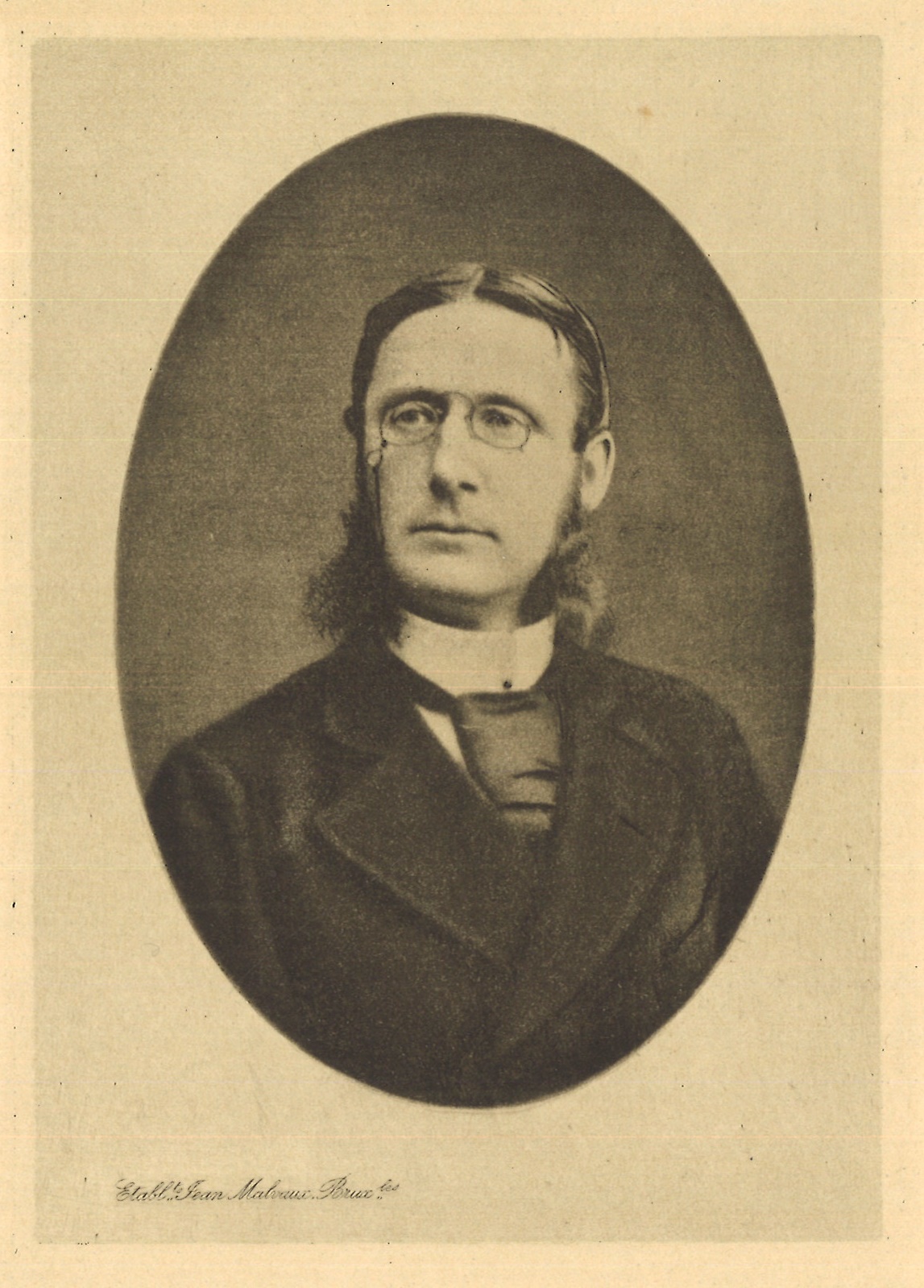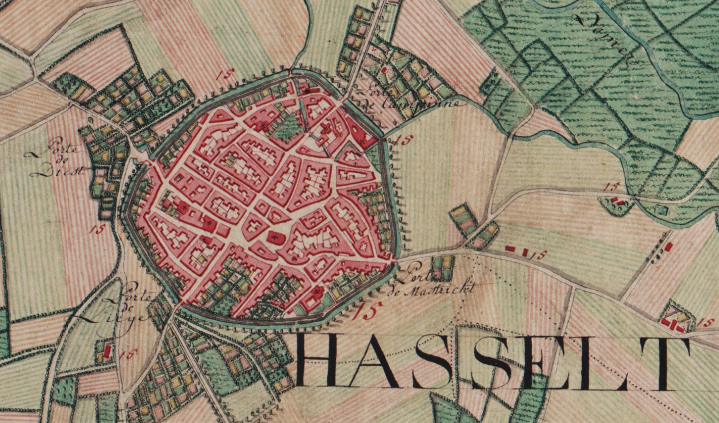|
Stanislas Bormans
Stanislas Marie Bormans (1835–1912) was a Belgian archivist and historian. Life Bormans was born in Hasselt on 2 February 1835. When he was a few months old, his father, Jean-Henri Bormans, was appointed a professor at the University of Ghent. Two years later he transferred to the University of Liège.Joseph Cuvelier, "Bormans, Stanislas", ''Biographie Nationale de Belgique''vol. 29(Brussels, 1956), 332-338. Stanislas graduated Doctor of Philosophy in July 1857 and was appointed assistant curator of the State Archives in Liège. In 1864 he married Victoire Francotte, daughter of a family in Liège. In 1873 he became curator of the State Archives in Namur, but in 1882 he returned to his former position of assistant curator in Liège so that his wife, whose health was poor, could be near her parents. In 1884 he became chief curator of the archives in Liège, but in 1885 he was appointed to the University of Liège, where he remained until his retirement in 1905. He taught palaeogra ... [...More Info...] [...Related Items...] OR: [Wikipedia] [Google] [Baidu] |
Hasselt
Hasselt (, , ; la, Hasseletum, Hasselatum) is a Belgian city and municipality, and capital and largest city of the province of Limburg in the Flemish Region of Belgium. It is known for its former branding as "the city of taste", as well as its local distelleries of Hasselt jenever (gin), the Hasselt Jenever Festivities, Limburgish pie and the Hasselt speculaas. The municipality includes the original city of Hasselt, plus the boroughs of Sint-Lambrechts-Herk, Wimmertingen, Kermt, Spalbeek, Kuringen, Stokrooie, Stevoort and Runkst, as well as the hamlets and parishes of Kiewit, Godsheide and Rapertingen. On 01 July 2022 Hasselt had a total population of 80,260 (39,288 men and 40,972 women). Both the Demer river and the Albert Canal run through the municipality. Hasselt is located in between the Campine region, north of the Demer river, and the Hesbaye region, to the south. On a larger scale, it is also situated in the Meuse-Rhine Euroregion. History Hasselt was founded in a ... [...More Info...] [...Related Items...] OR: [Wikipedia] [Google] [Baidu] |
University Of Ghent
Ghent University ( nl, Universiteit Gent, abbreviated as UGent) is a public research university located in Ghent, Belgium. Established before the state of Belgium itself, the university was founded by the Dutch King William I in 1817, when the region was incorporated into the United Kingdom of the Netherlands after the fall of First French Empire. In that same year, he founded two other universities for the southern provinces as well, alongside Ghent University: University of Liège and State University of Leuven. After the Belgian revolution of 1830, the newly formed Belgian state began to administer Ghent University. In 1930, UGent became the first Dutch-speaking university in Belgium. Previously, French (and, even earlier, Latin) had been the standard academic language in what was ''Université de Gand''. In 1991, it was granted major autonomy and changed its name accordingly from ''State University of Ghent'' ( nl, Rijksuniversiteit Gent, abbreviated as ''RUG'') to its c ... [...More Info...] [...Related Items...] OR: [Wikipedia] [Google] [Baidu] |
University Of Liège
The University of Liège (french: Université de Liège), or ULiège, is a major public university of the French Community of Belgium based in Liège, Wallonia, Belgium. Its official language is French. As of 2020, ULiège is ranked in the 301–350 category worldwide according to ''Times Higher Education'', 451st by ''QS World University Rankings'', and between the 201st and 300th place by the '' Academic Ranking of World Universities''. More than 2,000 people, including academics, scientists and technicians, are involved in research of a wide variety of subjects from basic research to applied research. History The university was founded in 1817 by William I of the Netherlands, then King of the United Kingdom of the Netherlands, and by his Minister of Education, Anton Reinhard Falck. The foundation of the university was the result of a long intellectual tradition which dates back to the origins of the Prince-Bishopric of Liège. Beginning in the eleventh century, the influenc ... [...More Info...] [...Related Items...] OR: [Wikipedia] [Google] [Baidu] |
Joseph Cuvelier
Joseph Cuvelier (1869–1947) was a Belgian archivist and historian. Life Cuvelier was born in Bilzen on 6 May 1869 and was educated at state secondary schools there and in Tongeren.Camille Tihon, "Cuvelier (Joseph)", ''Biographie Nationale de Belgique''vol. 31(Brussels, 1961), 240-244. He studied history at the University of Liège under Godefroid Kurth, graduating with a doctorate in 1892. At the end of 1894 he was appointed to the State Archives in Liège. On 30 June 1896 he was appointed assistant conservator of the State Archives in Bruges, and in 1900 to the National Archives of Belgium in Brussels, where he would remain for 35 years. At Arthur Gaillard's death in 1912 he became acting head archivist, and was appointed to the function of head archivist in 1913. In the summer of 1913 he undertook a study trip to the principal archives of Germany, Austria and Switzerland. His report of this trip was later translated into English in 1939. Cuvelier was one of the founders of the ... [...More Info...] [...Related Items...] OR: [Wikipedia] [Google] [Baidu] |
Biographie Nationale De Belgique
The ''Biographie nationale de Belgique'' ( French; "National Biography of Belgium") is a biographical dictionary of Belgium. It was published by the Royal Academy of Belgium in 44 volumes between 1866 and 1986. A continuation series, entitled the ''Nouvelle Biographie Nationale'' ("New National Biography"), has been published by the Royal Academy of Science, Letters and Fine Arts of Belgium since 1988. Both the ''Biographie nationale'' and ''Nouvelle biographie nationale'' were digitised by the Fonds InBev-Baillet Latour and can be freely consulted at the Academy's website. A parallel biographical dictionary has been produced in Dutch since 1964, entitled the ''Nationaal Biografisch Woordenboek'' ("National Biographical Dictionary"). It places more emphasis on figures important to the history and culture of Flanders and is published by the Royal Flemish Academy of Belgium for Science and the Arts (with the co-operation of the Royal Academy of Dutch language and literature and the R ... [...More Info...] [...Related Items...] OR: [Wikipedia] [Google] [Baidu] |
State Archives (Belgium)
The State Archives (french: Archives de l'État or AE, nl, Rijksarchief) is the institution which preserves the national archives of Belgium. It is a research institute of the Belgian Federal Science Policy Office (Belspo) under the Belgian Federal Government. The State Archives is composed of the National Archives in Brussels and 18 repositories throughout Belgium. Each repository has its own reading room, where the public can consult paper or digital archives in compliance with the rules and laws regarding the privacy of certain data. As a knowledge centre for historical information and archival sciences, the State Archives preserve of archives and of books . Karel Velle is the incumbent director-general. Administrative organization The National Archives and State Archives in the Provinces is divided into 4 departments: ;Department I - Archives in the Brussels-Capital Region * National Archives of Belgium (French: Archives générales du Royaume) (head office) * Belgi ... [...More Info...] [...Related Items...] OR: [Wikipedia] [Google] [Baidu] |
Palaeography
Palaeography (American and British English spelling differences#ae and oe, UK) or paleography (American and British English spelling differences#ae and oe, US; ultimately from grc-gre, , ''palaiós'', "old", and , ''gráphein'', "to write") is the study of historic writing systems and the deciphering and dating of historical manuscripts, including the analysis of historic handwriting. It is concerned with the forms and processes of writing; not the textual content of documents. Included in the discipline is the practice of deciphering, reading, and dating manuscripts, and the cultural context of writing, including the methods with which writing and books were produced, and the history of Scriptorium, scriptoria. The discipline is one of the auxiliary sciences of history. It is important for understanding, authenticating, and dating historic texts. However, it generally cannot be used to pinpoint dates with high precision. Application Palaeography can be an essential skill ... [...More Info...] [...Related Items...] OR: [Wikipedia] [Google] [Baidu] |
Louis Abry , names sometimes translated to English as "Louis"
{{disambiguation ...
Louis may refer to: * Louis (coin) * Louis (given name), origin and several individuals with this name * Louis (surname) * Louis (singer), Serbian singer * HMS ''Louis'', two ships of the Royal Navy See also Derived or associated terms * Lewis (other) * Louie (other) * Luis (other) * Louise (other) * Louisville (other) * Louis Cruise Lines * Louis dressing, for salad * Louis Quinze, design style Associated names * * Chlodwig, the origin of the name Ludwig, which is translated to English as "Louis" * Ladislav and László - names sometimes erroneously associated with "Louis" * Ludovic, Ludwig, Ludwick, Ludwik Ludwik () is a Polish given name. Notable people with the name include: * Ludwik Czyżewski, Polish WWII general * Ludwik Fleck (1896–1961), Polish medical doctor and biologist * Ludwik Gintel (1899–1973), Polish-Israeli Olympic soccer player ... [...More Info...] [...Related Items...] OR: [Wikipedia] [Google] [Baidu] |
Ernest De Rye
Ernest is a given name derived from Germanic word ''ernst'', meaning "serious". Notable people and fictional characters with the name include: People *Archduke Ernest of Austria (1553–1595), son of Maximilian II, Holy Roman Emperor *Ernest, Margrave of Austria (1027–1075) * Ernest, Duke of Bavaria (1373–1438) *Ernest, Duke of Opava (c. 1415–1464) * Ernest, Margrave of Baden-Durlach (1482–1553) *Ernest, Landgrave of Hesse-Rheinfels (1623–1693) * Ernest Augustus, Elector of Brunswick-Lüneburg (1629–1698) * Ernest, Count of Stolberg-Ilsenburg (1650–1710) *Ernest Augustus, King of Hanover Ernest Augustus (german: Ernst August; 5 June 177118 November 1851) was King of Hanover from 20 June 1837 until his death in 1851. As the fifth son of King George III of the United Kingdom and Hanover, he initially seemed unlikely to become a m ... (1771–1851), son of King George III of Great Britain * Ernest II, Duke of Saxe-Coburg and Gotha (1818–1893), sovereign duke o ... [...More Info...] [...Related Items...] OR: [Wikipedia] [Google] [Baidu] |




